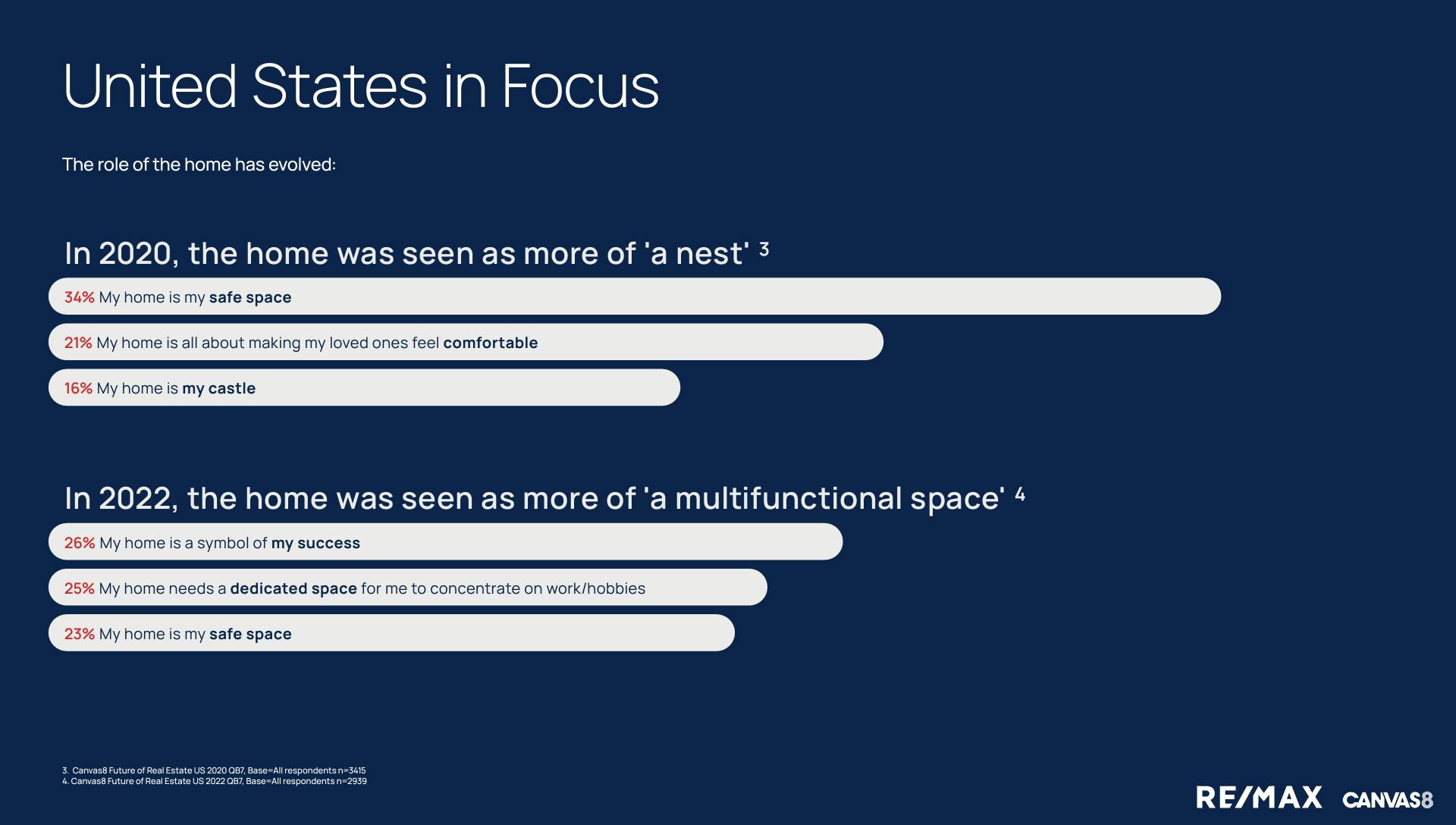The real estate market is forever in flux – and the past few years of changing housing prices, consumer demand and mortgage rates have had a considerable effect. The landscape of homeownership in the U.S. continues to evolve, and economic factors are adjusting the priorities of homebuyers and sellers.
That’s why the 2023 RE/MAX Future of Real Estate Report examines the market from all sides.
The report – a “comprehensive, current analysis of consumer tendencies and professional strategies around buying, selling, or owning a home” according to RE/MAX President and CEO Nick Bailey –explores the cultural context and influential trends set to shape the real estate and housing landscape in the United States in the year ahead.
Qualitative and quantitative data help reveal the current sentiment of real estate consumers and indicate where buying and selling trends could be heading.
“The events of the past few years have made homebuyers more deliberate about what a home should offer them,” Bailey says.“A home purchase is one of the largest transactions a person will make in their lifetime, so it’s important for them to have a clear understanding about what they’re seeking in a home. Research like this can help a real estate professional guide them in their search.”
Take a look at a few key findings from the latest Future of Real Estate report:
The majority of U.S. consumers see trust as an increasingly important factor in choosing an agent
In any market, real estate consumers seek out the expertise and guidance of a trusted professional. But according to data from 2022, this desire for dependability has grown even stronger.
The report reveals that 54% of study participants think trust and familiarity have become more important factors when choosing a real estate agent in the past 12 months.
Buyers want slightly different things from their agents. According to the report, 48% of American homebuyers said they seek the help of an agent for researching listings. They also want help identifying the best-fitting qualities of a property as well as identifying the smartest repairs and renovations.
Sellers, on the other hand, have different priorities – 52% seek out an agent specifically for help pricing their home. They also want an agent who’ll help them understand the selling process as a whole, and they especially value guidance in the closing stage.
From the perspectives of both homebuyers and sellers, agents are cornerstones in the logistics of their transaction – and also in their emotional security.
Today, more than ever before, consumers are conducting much of their home search process online. Though an accessible avenue, this route is also rewiring expectations and overloading consumers with options – many of them not a great match.
“Some people struggle to filter what they’ve found online into a more realistic picture of what they need. Forced to leave their expectations at the door, many are discovering that the reality of their real estate journey is much more complex than they’d anticipated,” the report shares. “The power of real estate agents to offer buyers and sellers experience in the form of their on-the-ground intelligence is clear.”
Knowledge of the local market is one major benefit of working with a real estate professional – another being their deeply rooted understanding of complex processes. The report cites that 40% of surveyed American consumers view real estate terminology as a key barrier to homeownership. This pain point is alleviated by having a real estate agent – who serves as a translator of sorts – helping navigate their buying and selling journeys.
Half of U.S. consumers saw economic uncertainty as a key barrier to ownership in 2022
When the economic environment changes, so do real estate consumers’ priorities. Though the report points to an increase in homeowners viewing their homeownership as a symbol of success, those currently in the pursuit of buying a home are having to reprioritize their wants versus needs to make the goal of ownership happen. After all, 50% of Americans say economic uncertainty was a key barrier to ownership in 2022.
The report cites financial readiness being twice as important than relationship status for consumers preparing to buy a home. A factor that breaks tradition, more people are seeking alternate routes to homeownership – like co-buying with a friend or family member – to lock down stable housing and start generating equity.
Economic uncertainty can also mean that those who are purchasing homes are increasingly looking for ones that are built to last, or “future-proofed.”

Gen Z buyers are more interested in smart features (78%), new builds (77%), and sustainable materials (81%) than older cohorts
“Buying a property is considered to be one of the biggest investments an individual can make in their lifetime so it’s no surprise people want to get it right. Increasingly, that means considering the longevity and resilience of a home, as well as how structurally sound, climate resilient or weatherproof it is,” the report says.
This uptick in concern for the durability of a property ties to the function of a real estate agent helping consumers prioritize and make sound financial decisions when it comes to homeownership.
One way prospective homebuyers are looking to save resources – and dollars – is through efficient energy systems. According to the report, 73% of Americans consider energy insulation an important factor when buying a property, up from 60% in 2020. This increase in recent years can be attributed to both economic uncertainty driving frugality, inflation causing a rise in costs, and an increase in awareness for one’s impact on the environment.
Energy efficiency can even be as simple as concern for the airflow in a house, determining how to keep the place warm in the winter and cool in the summer. Consequently, 65% of Americans consider the overall age of a building to be an important factor when looking for a home to buy. While older homes tend to be full of history and character, they can also be expensive for energy costs when things like insulation aren’t addressed.
While sustainability is top of mind for many consumers, it’s especially important to younger generations of prospective homebuyers. The report cites that Gen Z buyers are more interested in smart features (78%), new builds (77%), and sustainable materials (81%) than older cohorts.
Sustainability practices – including energy efficiency – as well as heightened awareness for routine maintenance and regular repairs are all key factors to today’s homebuyers and homeowners creating future-proofed properties.
The 2023 RE/MAX Future of Real Estate Report was created in collaboration with creative agency Camp + King and cultural research partner Canvas8. The elaborate process of collecting data included interviews, trend analysis, real estate agent commentary, surveys and more.
To learn more about where real estate is heading in the U.S – including the increasing tie between living space and self-expression – download the full 2023 RE/MAX Future of Real Estate Report.


